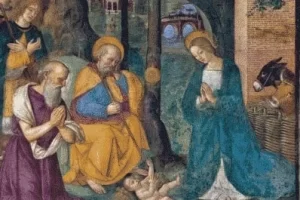Jesus wants each of us to reach the fullness of life
They will receive “a hundredfold” in this life, and then eternal happiness[1] is Jesus’ promise to those who have followed him closely with an exclusive vocation. They will not receive that hundredfold in just any way, but they will receive it in their affections, precisely, in father, mother, brothers, sisters, wife, husband, or children…
Table of Contents
- 1. The True Face of Love
- 2. “You duped me, O LORD, and I let myself be duped!”
- 3. The Divine Dynamics of Love
- 4. Supernatural love ignites projects and illusions: it gives hope
- 5. Love and Fidelity
Jesus wants each of us to reach the fullness of life as a response to His Love. He knows that every man is called to live for love, towards Love, and receive love here in this life.
Therefore, for those who live celibacy, a fundamental question is whether one can really live in love following this path. Can one feel sincerely in love with God? Or is it rather a way of saying but really means that deep down there is a desire that must be resigned? In this chapter, we propose some ideas which help to answer that question and facilitate vocational discernment.
1. The True Face of Love
What does it mean “to be in love“? What do we mean by love? Many theories try to explain what love is. We want to approach the topic from the point of view of experience, of what we actually live. We can, therefore, ask ourselves: what does a young couple or a mother at the bedside of her sick child, a marriage with many years of fidelity, a priest who lovingly cares for the Holy Mass every day, a celibate person who goes out with enthusiasm every day to share their daily life with Jesus all have in common? What they have in common is love. Love is what identifies them.
There is diversity in these loving relationships. Some of them can be considered more romantic. Others speak of a sincere donation that opens its way in pain and surrender. In these few examples, there are perhaps bursts of happiness together with moments of suffering, tiredness, or apathy. There are routine and exciting moments, the everyday is intertwined with the unrepeatable. But in all of them, we see that there is love. Thus, we understand that one can live in love on the path of celibacy, as well as on the path of marriage.
Beyond enthusiasm for celibacy
In sincere love, the feeling of well-being, enthusiasm, even obsession is just one of the stages. Or perhaps, a feeling that accompanies some specific stages of love. We could think of a love that was always gratifying, almost automatically passionate, that bowls one over or drags one into surrender only by attraction. However, this would be a very poor expectation of love. With such a perspective, one could not live the path of celibacy in love, nor would a faithful love be sustained in marriage…
Falling in love is a phenomenon peculiar to human love, between man and woman, which has an emotional component, both strong and intimate. There is power in spontaneously capturing the pleasant and valuable things about another person. It is an experience that motivates one to join with another for life. It is the type of love that is usually at the origin of courtship. It has such great strength because it brings an implicit message: it infuses a promise of happiness that carries away the whole person.
Experiencing love in this way is based above all on the impulse of feelings. That is why it has great strength but also fragile stability. It is usually more eros than agape, more attraction than the decision of surrender. There is more impulsive force than freedom. This is not the form of love par excellence, nor does it give the necessary proof that true love exists. Falling in love is not the true face of love.
Living in love has more to do with our freedom than with our feelings. Man’s freedom is like the hands that weave love, using everyday circumstances as threads on the loom of reality that is presented to him.
Love as an act of the will
“Love must be essentially an act of the will -says Erich Fromm-, the decision to dedicate our whole life to the other person. That is, without a doubt, the reasoning that supports the idea of the indissolubility of marriage (…). In contemporary Western culture, such an idea seems erroneous. Love is supposed to be the result of a spontaneous and emotional reaction, the sudden appearance of an irresistible feeling (…). In this way, an important factor of love is overlooked, that of will. Loving someone is not merely a powerful feeling: it is a decision, a judgment, it is a promise. If love were nothing more than a feeling, there would be no basis for the promise of loving each other eternally. A feeling begins and may disappear. How can I judge that it will last forever if my actions do not imply judgment and decision?”[2].
Love then, is a force that leads to desire and surrender. The revolution that the attraction of love causes in us leads to the surrender of oneself[3].
The experience of the saints and many who live celibacy also gives us an answer. It shows us that they have been persons fully alive, with human and affectionate hearts, who have ordinarily passed through this world loving God and others. They have not felt frustrated by not having married; nor are they people who have stifled their emotions. If it had been like that, they would not have been happy. However, their hearts do not show anything special. They have felt loved and have loved on that diverse scale that celibacy proposes.
2. “You duped me, O LORD, and I let myself be duped!”
These words of the prophet Jeremiah (20:7) deeply reflect the relationship of love that God wants to establish when he chooses us and, on the other hand, the full freedom that is the only door to God’s love. To let oneself be seduced by the Lord is a decision that puts us in a positive and dynamic attitude to perceive God’s love, the tenderness behind his choice.
To let oneself be seduced means to want to see, observe, contemplate, to let God show me how he loves us in an exquisite, overflowing, and mysterious way. On the contrary, someone who lives his vocation comparing other seductive offers, the attractiveness of other ways of living, does not let himself be seduced by the Lord. Someone who lives calculating benefit, satisfaction, and usefulness, does not let himself be seduced by love. It is not that God forbids such an attitude, but rather that it is something that disarms the intimacy that love demands and undermines its hope.
No one falls in love until they discover the other person and their attractiveness. No one falls in love if they are calculating the benefits that different candidates can offer them. This is what the rich young man of the Gospel lacked: calculating and thinking about all he was leaving behind, he did not let himself be seduced by Jesus’ love and, therefore, did not feel capable of giving himself fully, of giving his freedom and his life, because the Lord was offering him his own.
Passively perceiving and accepting God’s love is an effortless attitude: one cannot fall in love if one does not pay active, interested attention, not just with our minds but with the heart. One cannot live in love if one goes through life looking at the offers behind the windows, to see if there is something attractive or waiting for God to make me an attractive offer.
The emotional maturity that allows us to live in love leads us to be attentive and eager to discover God’s love present in our lives, which manifests itself in a thousand ways in everyday things. Opening our hearts to God and keeping them sensitive to His affection is a fundamental part of the vitality of celibacy.
There is enough light or enough darkness
The intimacy of piety, the contemplation of Jesus’ gaze in prayer, the gift of making us participate in his fecundity in other souls through our lives, the history of our existence in which God has been discreetly lavishing his love… All this can be seen with great luminosity as well as ignored in complete darkness: seeing and recognizing God’s love does not depend only on God. It depends to a great extent on whether we let ourselves be seduced.
Is it possible to live celibate in love? After all that has been considered, we recognize -as Nietzsche says- that “there is always something of madness in love. But there is always also something of reason in madness.” Above all, in the madness of God who has been enthusiastic about the exclusivity of love for a poor human heart.
3. The Divine Dynamics of Love
Truly living in love with God is not merely a human endeavor. It is primarily a divine action, a gift from the Heart of God. It is not about a particular emotional training to achieve the feeling of God. God’s life acts within the human being who offers his heart, and in a sense, it also overflows into affections. It is the work of the Holy Spirit -God’s Personal Love- in the heart.
The strength of God in the soul grants us certain supernatural capacities so that our human powers can relate to God and the divine with a certain connaturality. We know this divine force by the name of theological virtues: faith, hope, and charity. These are capacities that God bestows when we do our part. They are called theological because they lead us to reach God, which is possible only with His help.
Theological virtues are a true force
Theological virtues are a true force, a dynamism that must become the driving force of all spiritual life. The maturity of a Christian consists of reaching the point of believing in God, hoping for everything from Him, and loving Him and our neighbor with all our hearts. The other aspects of Christian life pursue only this end: to increase in us that strength of God[4].
This divine force needs our free collaboration to grow and unfold. God’s strength adapts to human ways of acting and feeling, giving them life and impetus from within. Thus, it gives us the ability to reach what we cannot reach alone, grace being like a second nature. This collaboration between grace and freedom is necessary to perceive God’s love.
Sometimes we have an overly spiritualistic view of faith, hope, and charity. And so, we don’t rely on them much for the transformation of our daily lives and our affections. For those who live celibacy, it is essential to seek this strength, to know it better, and to help it unfold.
The Holy Spirit shapes affectivity
The action of the Holy Spirit is designed to shape our perspectives, helping us to tune in to the Love of God. The dynamic nature of the theological virtues is supported by- although not entirely- the psychological structure of man. This capacity is particularly related to the maturity and emotional completeness of the Christian and specifically, of those who live celibacy.
We can see, for example, the action of the Paraclete transforming Saint Peter. Pentecost gives him and the Apostles the courage to love God above all things. The influence of the action of the Spirit on Peter is evident. While not just emotional, the action of God finds in him a free welcome and transforms his whole person, not only his intelligence and will. It also permeates his heart.
The supernatural dynamic of grace, as can be seen, has a lot to do with affective maturity, as it fosters the heart’s disposition to perceive a reality beyond us, but is completely real. The gift of wisdom is closely united to charity, and through it, God gives a special knowledge of supernatural realities and of the people that dispose the soul to possess “a certain experience of the sweetness of God”, in Himself and in created things, insofar as they are related to Him[5].
4. Supernatural love ignites projects and illusions: it gives hope
Charity cannot exist without hope. “Love needs space to expand and grow.” Love is a wonderful reality, but in a certain sense also fragile, since without its vital space it easily ends up suffocated, compressed, and unproductive.
And the specific means it needs to unfold is found in hope. If we pay attention to what happens within us, we will realize that when love cools down or stops growing, it is often because our longings, our fears, our worries, and our discouragement are suffocating it. In a dialogue with Saint Faustina, Jesus affirms that ‘the greatest obstacles to holiness are discouragement and anxiety’”[6]. Most of the time we do not grow in God’s love because we do not believe that He can make us happy. We lack faith, we do not fully believe in God. And that same thing leads us to feel far from Him.
Hope makes us live celibacy in love, truth and not utopia
Hope keeps illusions and projects alive. At the same time, it needs a solid truth to rest on. The foundation of hope is faith. By faith, I believe in the reality that allows me to hope: God is my omnipotent and benevolent Father, who loves me with unconditional love. “Faith is the mother of love and hope, as well as of trust and certainty”[7].
Lack of love, when it occurs in marriage or celibacy, has much to do with disenchantment, loss of illusion, and letting the burning expectations in the one who is loved decay. And when one loves only God, this decay can only be blamed on oneself. Thus, staying in love with God has much to do with purifying the heart of disenchantments.
Living in love with God is a grace, a gift, that can be cultivated, enriched, and helped to grow. There is an intimate and deep connection between human illusion and the strength of God that we must allow to expand and grow: the transformation that faith, hope, and charity work in us. The Christian “grasps the love of a personal God, which leads him to control his moods and guides him through objective values towards affective maturity”[8].
5. Love and Fidelity
Dealing with people, temporal beings ever changing and always under construction, fidelity is the process of constantly building love. A love that has as its raw material the circumstances, pleasant or adverse, that reality presents to us. Aspiring to real love means assuming that we are not looking for something static, as when we are in front of a photograph or the blueprint of a house. Love arises from a dynamic and constructive will. Fidelity is love seen in motion. Benedict XVI says: “fidelity over time is the name of love”[9].
Many times affection and feelings are experienced in a vocation: it is a great time to take advantage of them just as the wind that carries along a sailboat. But when these diminish or disappear, we must not lose the opportunity to move forward rowing, with the strength of our free will. This is powerfully illustrated by Stephen Covey, in his well-known book The 7 Habits of Highly Effective People. He reproduces a dialogue with a person who goes to ask for advice:
– Stephen, my wife and I are no longer united by the old feelings. I guess I don’t love her anymore, and she doesn’t love me anymore.
– Do you no longer feel anything for each other?
– That’s right. And we have three children, which worries us.
– Love her, -I replied.
– You don’t understand me. Love has disappeared.
-Then love her. If the feeling has disappeared, that’s a good reason to love her.
– But how to love when you don’t love?
– Love, as a feeling, is the fruit of loving. So, love her. Serve her. Sacrifice yourself for her. Listen to her. Share her feelings. Appreciate her. Support her. Are you willing to do it?[10]
Fidelity is the ability to maintain the process, from utopia to truth
Fidelity is the ability to maintain a process: like the process of building a house or flying. Love is what the process is doing: the house, for the one who builds it, or ascending the heights, for the eagle that flies.
Fidelity is maintained in a process not only with effort and decision but above all with hope. A hope that -as we have seen before- is the fuel of love. No one can be faithful if they settle for the happiness they have here and now. Nor can anyone be faithful if they lose sight of their ultimate destiny and focus only on the effort that -here and now- means continuing building.
The will with which we say yes! to the vocation must be unconditional, since “who does not decide to love forever” -said John Paul II-, “can hardly love truly even one day”[11].
The good lover lives to love
Gustave Thibon shows the decision that sustains love between two people, and that we can apply to fidelity to God.
“I quote very often” -says the French thinker- a phrase from Bismarck (…), when writing to his young wife, since she, a shy creature, had not accompanied him in all the vicissitudes of his brilliant career. She had written: “You will forget me, a provincial girl, among your princesses and your ambassadors.” He replied: “Do you forget that I married you to love you.”.
“This phrase seems definitive to me” –Thibon continues-. “Not simply ‘because I loved you’, but ‘to love you’. Which means throwing an anchor into the future. Separating an eternal reality from the fleeting emotions of the senses and imagination”[12].
Fidelity gives us the capacity not to absolutize the eros that we usually expect from love. And, when the time comes, it makes us aware that “we must do the works of eros when eros is no longer present. All good lovers know this,” says C. S, Lewis in The Four Loves.
Fernando Cassol
Article notes: Living Celibacy in Love: truth or utopia?
[1] Cf. Mc 10, 28-31.
[2] Fromm, E. The Art of Loving, Paidós, Barcelona (1990), 60-61.
[3] For a broader reflection on this important topic, cf. Benedict XVI, Encyclical Deus Caritas est, especially nos. 7 and 8.
[4] Cfr. Philippe, J., La libertad interior, Ed. San Pablo, Buenos Aires (2005), Chapter. III, 87-133.
[5] S. Tomás de Aquino, Suma Teológica, 1-2, 1. 112, a. 5.
[6] Philippe, J., La libertad interior, Ed. San Pablo, Buenos Aires (2005), 122.
[7] Philippe, J., La libertad interior, Ed. San Pablo, Buenos Aires (2005), 126.
[8] Vial, W., Madurez psicológica y espiritual, Ed. Palabra, Madrid (2016), 115.
[9] Benedict XVI, Speech in the Church of the Santísima Trinidad–Fatima, 12-V-2010
[10] Covey, S. R., Los 7 hábitos de la gente eficaz, Paidós, Mexico (1994), 91.
[11] John Paul II, Homily in Córdoba, Argentina, 8-IV-1987.
[12] Thibon, G. Entre el amor y la muerte, Rialp, Madrid (1997), 59-60.







0 Comments